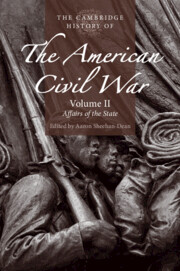Book contents
- The Cambridge History of the American Civil War
- The Cambridge History of the American Civil War
- The Cambridge History of the American Civil War
- Copyright page
- Contents
- Contributors to Volume II
- Note on the Text
- Part I Causes
- 1 The Antebellum War over Slavery
- 2 The Election of 1860
- 3 Secession and Disunion
- Part II Managing the War
- Part III The Global War
- Part IV Politics
- Index
- References
1 - The Antebellum War over Slavery
from Part I - Causes
Published online by Cambridge University Press: 11 October 2019
- The Cambridge History of the American Civil War
- The Cambridge History of the American Civil War
- The Cambridge History of the American Civil War
- Copyright page
- Contents
- Contributors to Volume II
- Note on the Text
- Part I Causes
- 1 The Antebellum War over Slavery
- 2 The Election of 1860
- 3 Secession and Disunion
- Part II Managing the War
- Part III The Global War
- Part IV Politics
- Index
- References
Summary
For decades historians of the Civil War Era have agreed that the causes of the war lay in issues related to slavery rather than sectional disagreements over economics and state rights. Northern criticism of the slave labor system, Southern proslavery defensiveness, Southern efforts to expand slavery into US territories, Northern fear of proslavery domination of the federal government, and a Northern free-labor ideology all had roles. While recognizing the importance of these slavery-related factors, this chapter emphasizes the role of physical conflict over slavery itself in pushing the two sections toward war. Slave escapes, Southern attempts to recapture escapees and kidnap free African Americans into slavery, Northern aid to the escapees and kidnap victims, and aggressive physical abolitionist interference with slavery in the South shaped this long conflict.
- Type
- Chapter
- Information
- The Cambridge History of the American Civil War , pp. 3 - 23Publisher: Cambridge University PressPrint publication year: 2019

